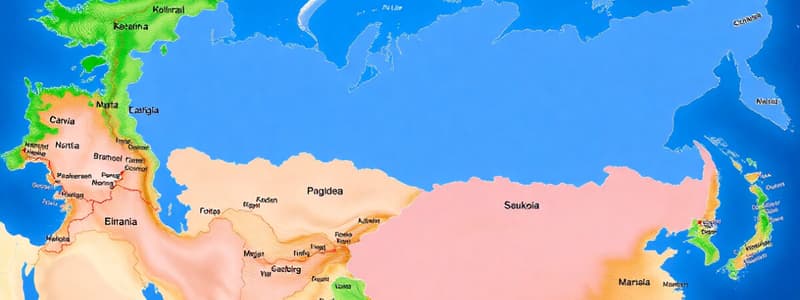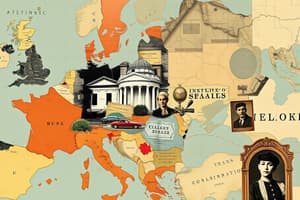Podcast
Questions and Answers
What is a primary characteristic that defines a state?
What is a primary characteristic that defines a state?
- A permanent population (correct)
- Presence of a single ethnic group
- Recognition from other states
- A history of conflict with neighboring territories
Which of the following best describes a nation?
Which of the following best describes a nation?
- A group of people sharing cultural traits (correct)
- An independent state recognized by other states
- A political entity with defined borders and a government
- A multinational state with diverse cultures
What distinguishes a nation-state from other political entities?
What distinguishes a nation-state from other political entities?
- The absence of a recognized government
- The alignment of a nation with the state's borders (correct)
- Having multiple ethnic groups within its borders
- Existing devoid of cultural unity
Which group of people is an example of a stateless nation?
Which group of people is an example of a stateless nation?
In which scenario would the term 'multistate nation' apply?
In which scenario would the term 'multistate nation' apply?
What is a multinational state?
What is a multinational state?
Which of the following is NOT a requirement for becoming a recognized state?
Which of the following is NOT a requirement for becoming a recognized state?
Which of the following Best defines sovereignty in the context of a state?
Which of the following Best defines sovereignty in the context of a state?
Flashcards
State
State
A political entity with a defined territory, permanent population, a government, and sovereignty - the right to control its land and affairs within its borders.
Nation
Nation
A group of people sharing a common identity, often through language, culture, religion, or ethnicity.
Nation-state
Nation-state
A state where the borders of the nation and the state align, ideally with only one nation within it.
Stateless nation
Stateless nation
Signup and view all the flashcards
Multistate nation
Multistate nation
Signup and view all the flashcards
Multinational state
Multinational state
Signup and view all the flashcards
Study Notes
Political Organization of Space
- Political space is organized into various entities.
- A state has a defined territory with borders, a permanent population, and a government.
- Sovereignty is the right of the government to control and defend its territory, plus determine actions within.
- Recognition from other states is crucial for a state's existence.
Criteria for a Country
- What criteria are needed for a place to be considered a country?
- The criteria include clear borders, a permanent population, a functioning government, and sovereignty.
Sealand
- Sealand is a small territory occupied by a person.
- It has a very limited land area.
- The debatable aspect of Sealand is whether or not it meets the criteria to be called a country.
Types of Political Entities
-
Nation: A group of people sharing a common cultural identity—language, religion, ethnicity, and heritage.
- Example: The Maasai in East Africa. They are a semi-nomadic ethnic group with a traditional culture and language.
-
Nation-State: Ideally, nations and states overlap completely in terms of borders.
- Example: Japan, Denmark, Iceland.
-
Stateless Nation: A nation of people who do not have their own state to occupy.
- Examples: The Kurds in SW Asia, The Basque in Spain, Palestinians in Israel.
-
Multistate Nation: A nation of people who live in more than one state.
- Example: Russians living in Estonia, Latvia, and Ukraine - after the Soviet Union dissolved.
-
Multinational State: A state with several culturally diverse ethnic groups in its territory. A state that encompasses a variety of ethnic groups.
- Examples: The United States, Russia, the former Yugoslavia, and Iraq.
-
Autonomous or Semi-Autonomous Region: A region within a state that has a degree of self-governance.
- Example: Hong Kong, Tibet, other regions.
Studying That Suits You
Use AI to generate personalized quizzes and flashcards to suit your learning preferences.




